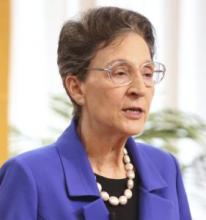Bernadette Brooten (Brandeis University) will give a virtual talk on the ways early Christian authors sought theologically to form gender and other relationships. Click here to register for the talk.
The Epistles to the Colossians and to the Ephesians, Titus, and 1 Peter enjoin either just the weaker parties in a household (wives, enslaved persons) or all parties (wives and husbands, children and fathers, enslaved persons and owners) to fulfill their respective duties. Subordinate persons, however, may well not have been able to fulfill these duties.
Could an enslaved child obey their parents when the master or mistress said otherwise? Could an enslaved wife be subordinate to her husband? Would the mistress or master even recognize a relationship that an enslaved wife saw as marriage? Did mistresses treat their enslaved laborers differently from masters?
The answers to these questions will demonstrate that a child is never just a child, but rather an enslaved, freed, or freeborn child, who also differs by gender, and that the same applies to other household members. In this lecture, I will explore how the early Christian authors of these writings sought theologically to form gender, freedom and enslavement, and childhood and parenthood in relation to one another.
Bernadette J. Brooten, Brandeis University Professor emerita, researches Jewish and Christian women’s history in the Roman world; female homoeroticism in the ancient Mediterranean; slavery in early Christianity; and sexual violence, currently in collaboration with Laurie Nsiah-Jefferson.
The Feminist Sexual Ethics Project aims to create Jewish, Christian, and Muslim sexual ethics rooted in freedom, mutuality, meaningful consent, responsibility, and the pleasure of each participant, untainted by slave-holding values. Publications include: Women Leaders in the Ancient Synagogue: Inscriptional Evidence and Background Issues (1982, 2020); Love Between Women: Early Christian Responses to Female Homoeroticism (1996; revised German edition, 2020); and, with the editorial assistance of Jacqueline L. Hazelton, editor: Overcoming Its Religious and Sexual Legacies (2010).
Brooten was a MacArthur Fellow and has held fellowships from the Harvard Law School, the Fulbright Foundation, the National Endowment for the Humanities, the Israel Institute for Advanced Studies, and many other agencies. In 2014, the University of Bern awarded her a Dr. Theol., honoris causa. She previously taught at the School of Theology at Claremont, the Claremont Graduate School, the University of Tübingen, Harvard University, the University of Oslo, and Williams College.
